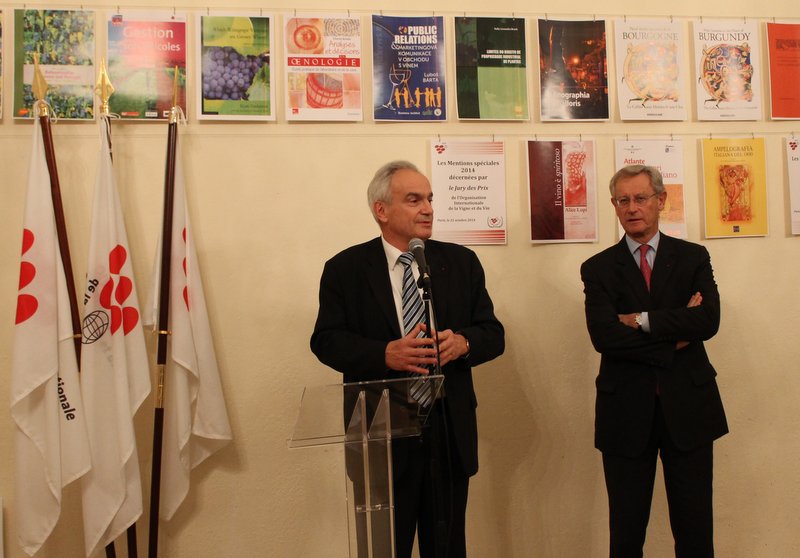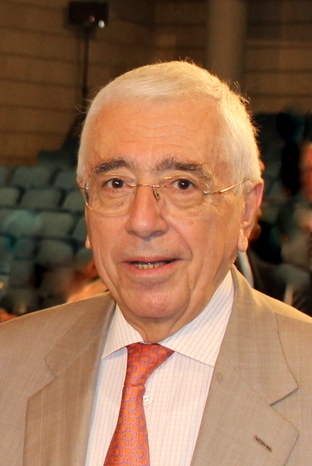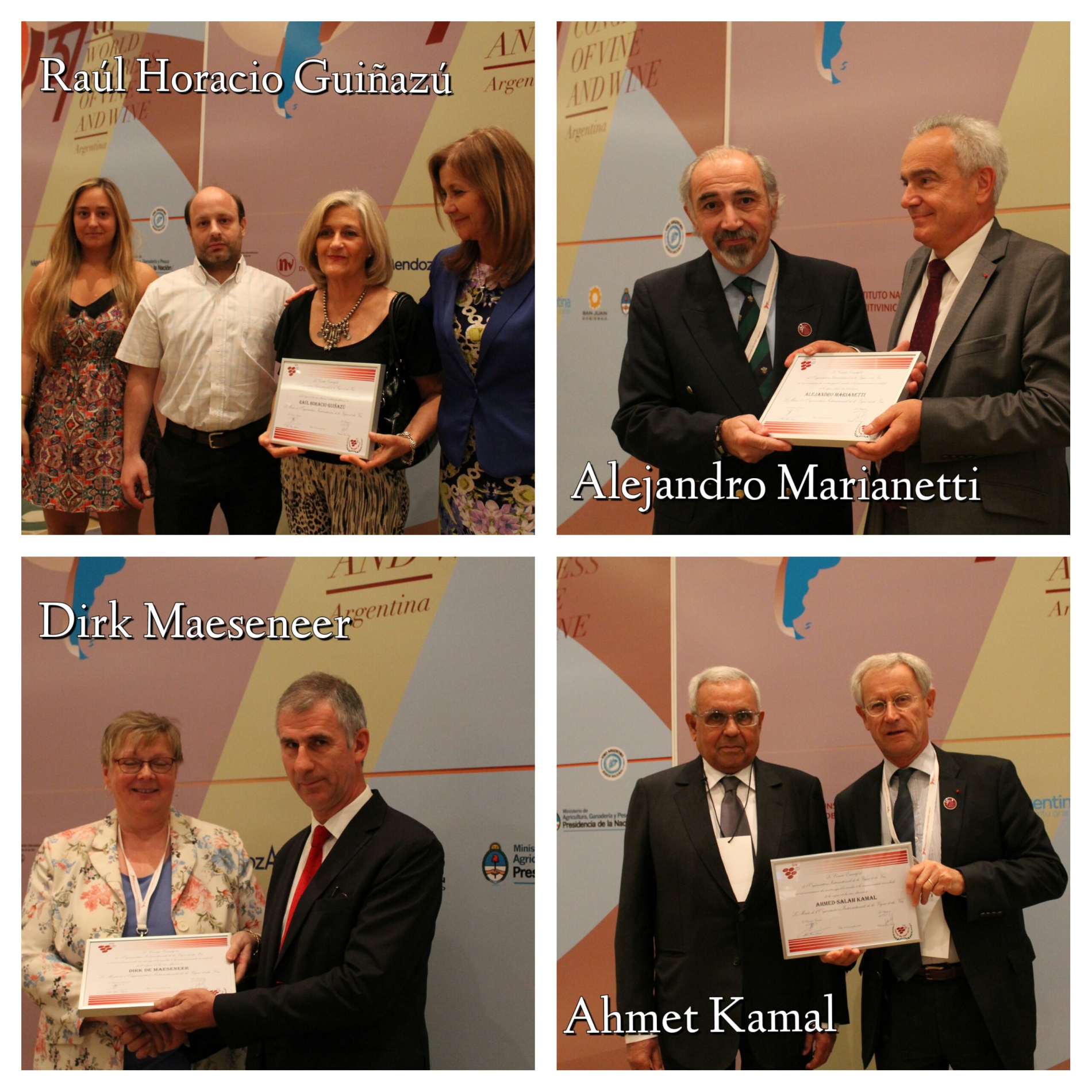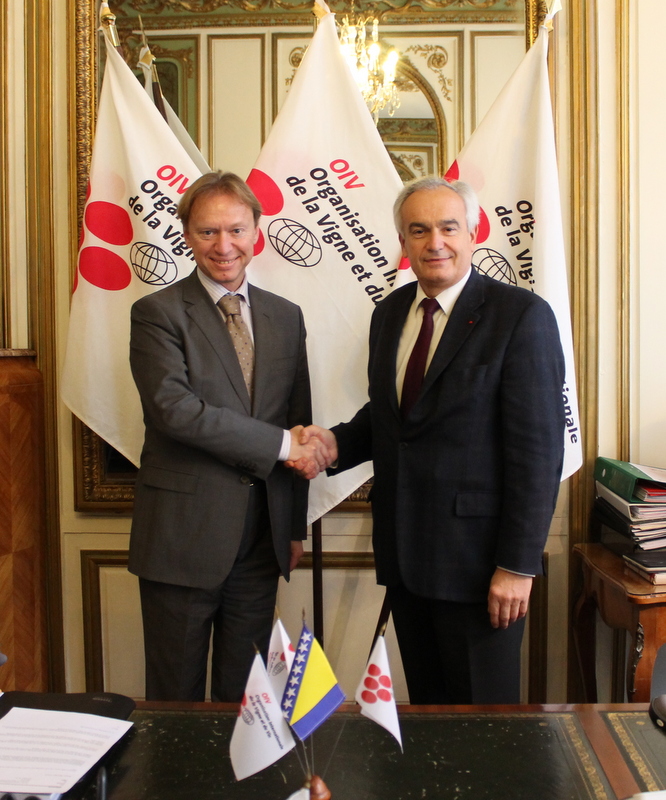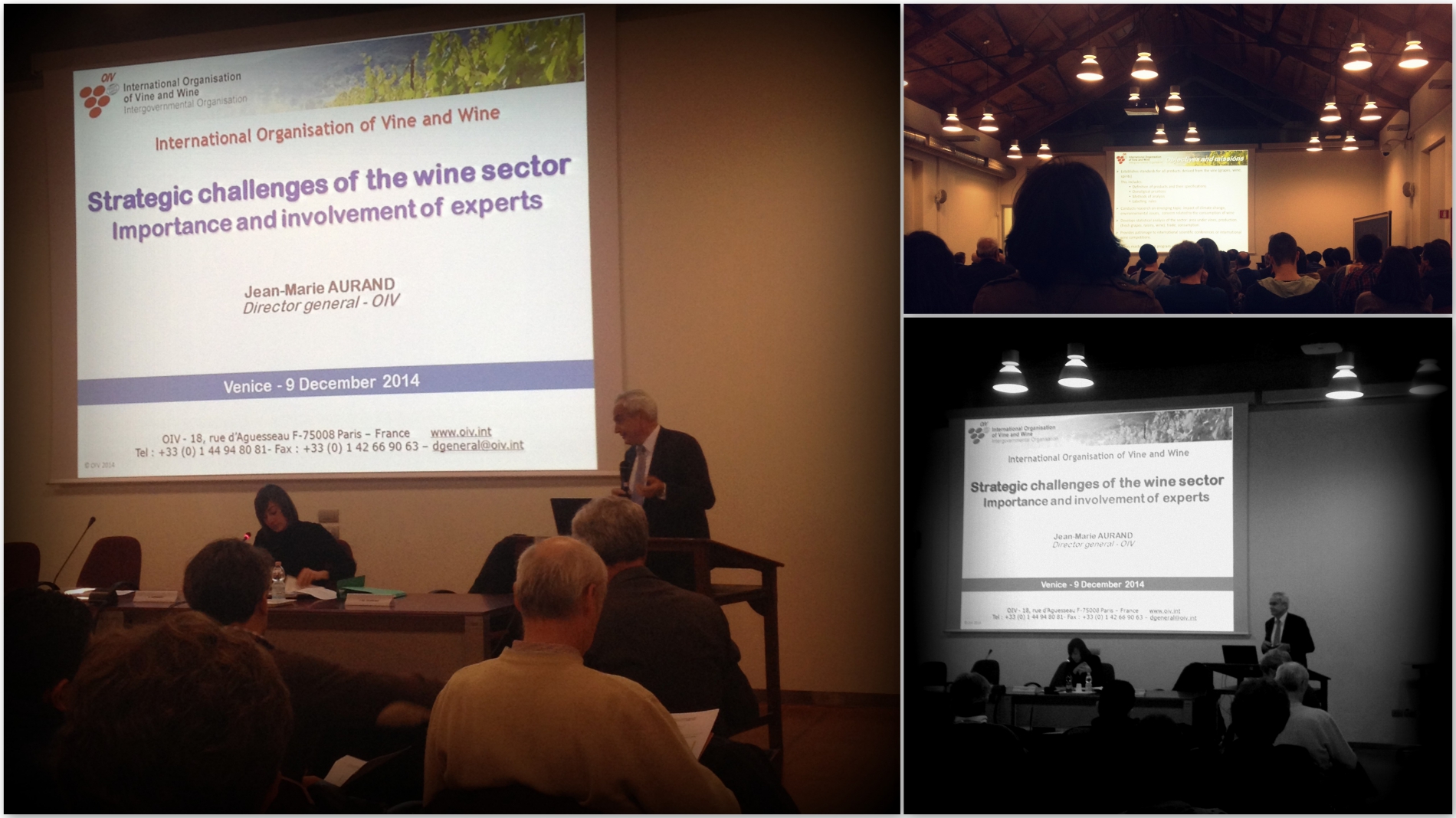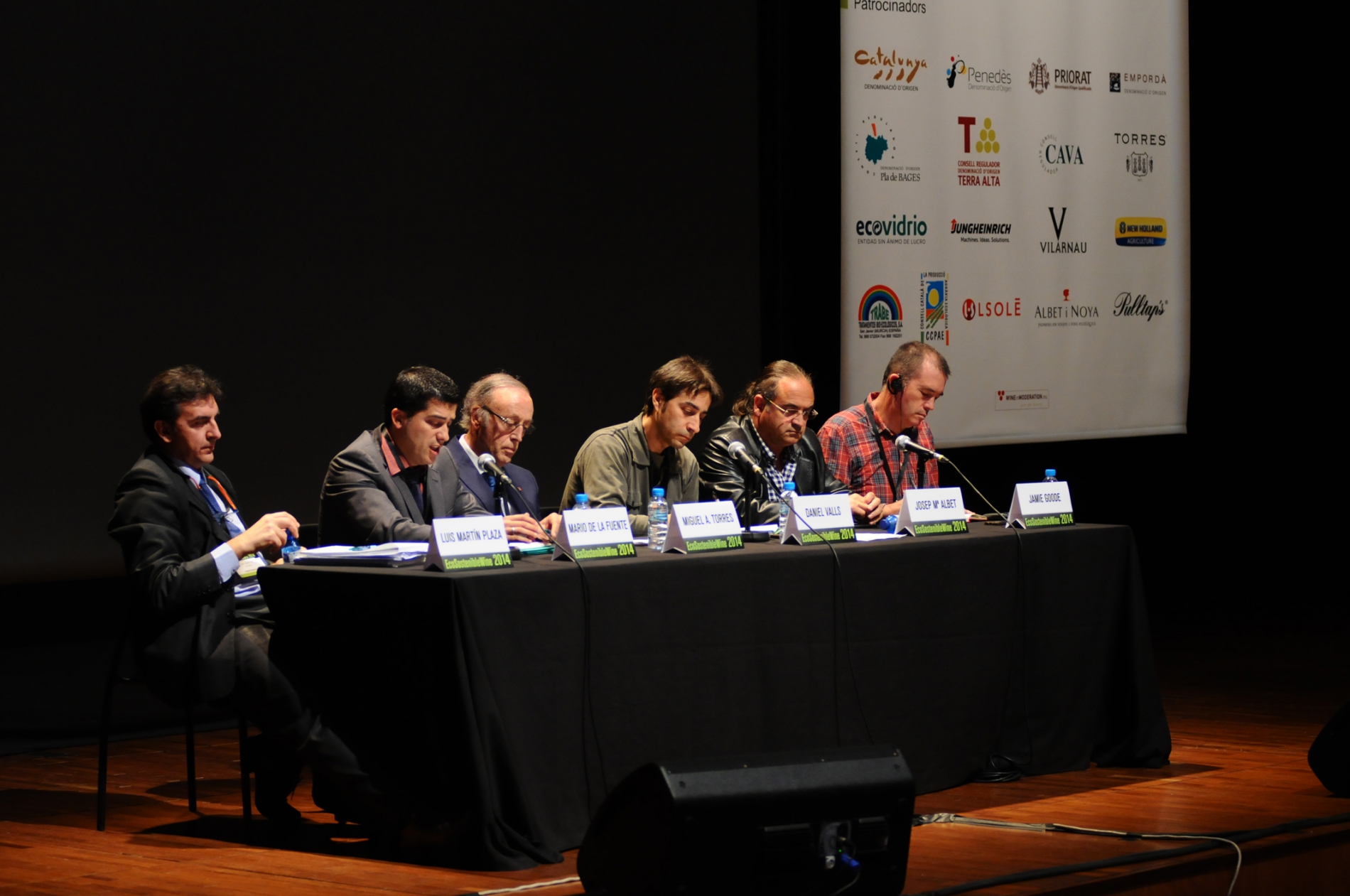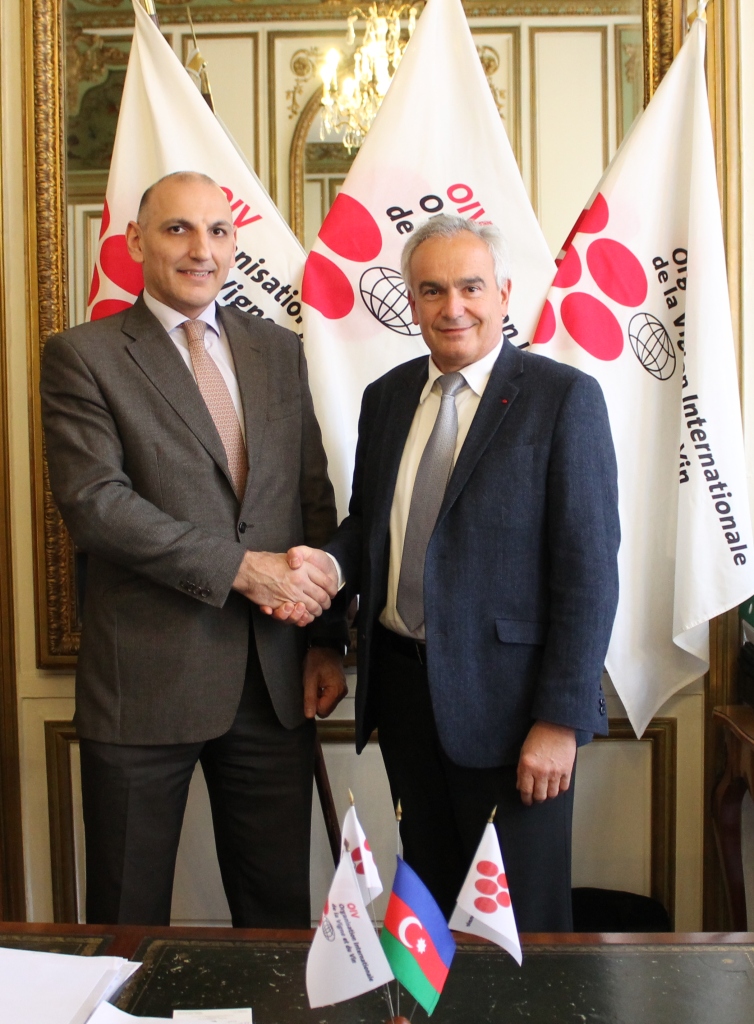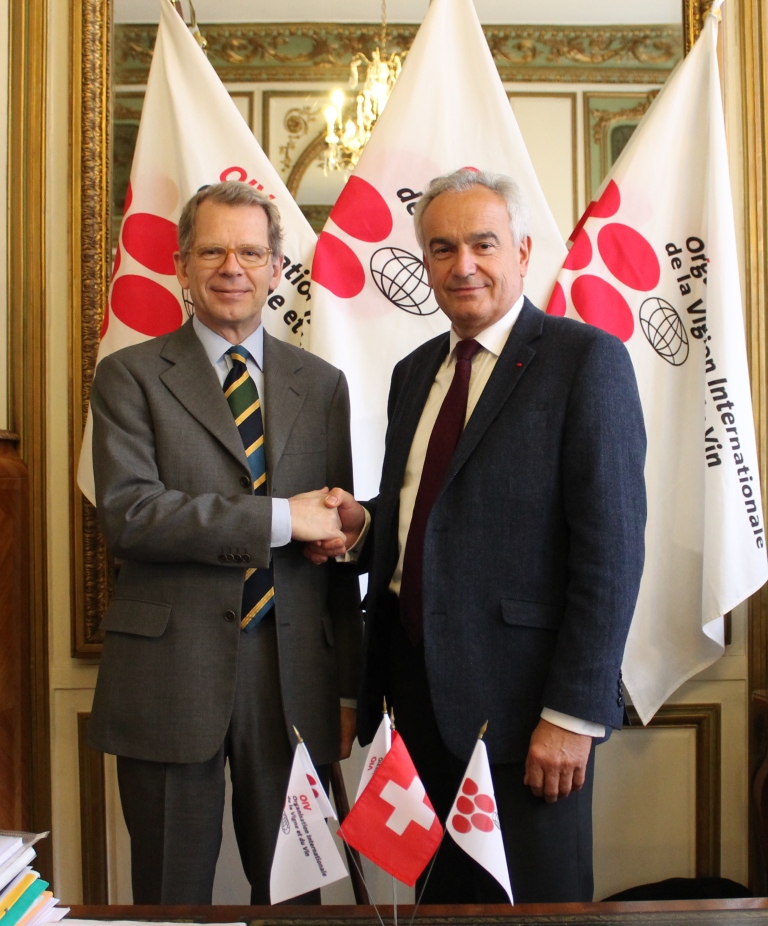22 Jan 2015
Mr Aurand summarised the events of 2014, his first year in office, highlighting the fact that "the OIV family has expanded, with the addition of our newest Member State, Armenia, which joined the organisation after Azerbaijan in 2013 and India in 2012. This growth shows that our Organisation is attractive and has a great image". Expressing his desire to negotiate more new memberships in 2015, the Director General reminded attendees that "our Member States currently represent almost 85% of global wine production and 80% of global wine consumption". Jean-Marie Aurand then paid tribute to the success of the 37th World Congress of Vine and Wine, which took place in November 2014, in Mendoza, Argentina, calling it "a memorable congress, which boasted more than 1000 participants and in which more than 500 scientific papers were presented". The General Assembly of the OIV also formally adopted the 2015-2019 Strategic Plan, the Organisation's roadmap for the next five years. "This plan takes into consideration major developments in the vitivinicultural sector: an increasingly globalised and internationalised market (2 out of every 5 bottles of wine consumed globally are imported), growing competition and new expectations from consumers and the general public", the Director General explained.In this context, "it is important to identify good practices and rules that preserve the stability and quality of products in order to ensure fair trade and to respond to consumer expectations in terms of product quality, health protection and transparency. This strategic plan also tackles new issues such as the impact of climate change and the promotion of sustainable viticulture" [2015-2019 Strategic Plan].Another highlight identified by Jean-Marie Aurand concerned "efforts to improve and modernize the operation of the Organization. For example, OIV experts can now, for the first time, disseminate their presentations and studies via a scientific publisher, [OIV-EDP Sciences], while communications and presentations are being enhanced by the use of statistical data from the vitivinicultural sector". The Director General of the OIV also reminded attendees that 2015 will see the election of a new president of the Organization, as well as new commission and sub-commission presidents, in Mainz, Germany, where the next OIV congress will take place on July 5th - 10th. He noted that the call for scientific papers for the congress had been launched and promised to be a great success [38th World Congress of Vine and Wine]. He also announced the redesign of the OIV website and the modernization of its IT systems. Finally, Jean-Marie Aurand welcomed the experts who will be attending the upcoming meetings in Paris in April to implement the 2015 work program, which he said promises to be rich and ambitious. He underlined the quality of their work and thanked them for their active involvement.
09 Jan 2015
This acceleration is related not only to the globalisation of consumption, but also to the steady increase in the number of producing countries. In this context, where competition is developing between countries, it is essential to define the characteristics of vitivinicultural products and their specifications, and to promote good regulatory practices in order to ensure fair trade and the integrity and sustainability of the various viticultural products on the world market. It is important to meet the expectations of consumers in terms of product quality, protection of health and the environment and information on vitivinicultural products, while maintaining a sustainable world market for wine.The OIV is uniquely positioned to provide wine producing and consuming countries with information to develop vitinicultural regulations that minimise barriers to trade, promote sustainable production and protect consumers. The OIV must ensure that its work is based on sound science. Therefore an ongoing review of OIV resolutions is an important aspect of the OIV workThere are considerable commercial, economic, environmental, territorial and societal challenges related to vine cultivation and vine-based products. The OIV should, provide its expertise and timely advice on these issues. The Strategic Plan 2015-2019 aims to provide the best response to these different concerns. It is a continuation of the last Strategic Plan (2012-2014), during which approximately sixty recommendations including oenological practices, methods of analysis and viticulture recommendations were evaluated by a community of international experts and adopted by the Member Countries. New categories of vitivinicultural products along with their presentation rules were also defined and adopted.A genuine road map, the 2015-2019 five-year plan is structured around the following five strategic axes:1.Promote sustainable vitivinicultureWithin the framework of vineyard development and evolutions of conventional vitiviniculture, the OIV aims to promote sustainable vitiviniculture. To do so, the OIV considers the challenge of climate change, characterizes and evaluates production methods of grapes, wine, other products and principles and analyses their economic efficiency, while considering corporate practices on social responsibility. The OIV protects and optimizes the use of natural resources and the sustainability of viticultural terroirs.2.Establish the authenticity rules of vitivinicultural products and promote good regulatory practicesIn order to categorize the vitivinicultural product, the OIV promotes principles of good regulatory practices and draws up recommendations on oenological practices and on methods of analysis. The OIV defines quality professional training courses of the sector.3.Understand market trends and supply chain dynamics Within the context of developing international trade in the wine sector and in order to understand whole-of-supply chain dynamics, the OIV will enhance its systems for exchanging information and statistical analysis and facilitates identification of markets trends across the value chain. 4.Contribute to the safety of the consumers and consider their expectations Based on assessment and scientific opinions, the OIV participates to the food safety of vitivinicultural products. It evaluates innovative technologies and physiological and nutritional aspects related to the consumption of vitivinicultural products as well as socio-behavioural factors. The OIV aims also to ensure consistency in regard to traceability and labeling.5.Strengthen international cooperation and OIV governance As a world intergovernmental organisation the OIV fosters international cooperation and participation of States and Observers. The OIV facilitates and highlights scientific production through an adequate communication.The 2015-2019 strategic plan is implemented in accordance with a work program annually adjustable adopted by the Executive Committee and to be developed by the various Commissions, sub-Commissions and groups of experts, scientific and technical committee.
05 Jan 2015
Since the accession of Lebanon in 1996, Serge Hochar played a major role in the renovation and development of the Lebanese vitivinicultural sector, working closely with the OIV.Head of the Lebanese OIV delegation for around fifteen years, he was also one of the architects of Lebanon's wine legislation established in 2000, Founder and President of the Union Vinicole du Liban and, more recently, President of the National Institute of Vine and Wine. He successfully positioned Lebanese wines on the international stage, a tireless ambassador dedicated to his passion and vision for his country's viticulture.Jean-Marie Aurand, Director General of the OIV, who visited Château Musar with Serge Hochar last September, paid tribute to him by highlighting "his philosophical vision of wines, which will remain as testimony to his passion."
24 Dec 2014
The Vice-President of the OIV, Ms Monika Christmann, affirmed the importance of all the OIV Member States and consumers particularly by presenting the OIV Merit to Mr Dirk de Maeseneer (Belgium), who for 15 years actively participated in the work of the OIV, especially during the period of re-establishment of the Organisation.Mr Alejandro Marianetti (Argentina) received the Merit Award from the Director General of the OIV, Mr Jean-Marie Aurand, who praised the agricultural engineer's career serving his country as part of the National Institute of Vitiviniculture (INV) as well as within the OIV, and also as a representative of all of the Institute's collaborators for their involvement in the organisation and the success of the World Congress of Vine and Wine.Mr Yves Bénard, Vice-President of the OIV, gave an award to his oenologist colleague from Morocco, Dr Ahmet Kamal, who took part in the activities of the OIV for 34 years and was an adviser at the state company for agricultural development and Director of the state company Sincomar, which manages the production, packaging and distribution of 80% of wines in Morocco.Finally, it was with a great deal of emotion that the President of the OIV paid tribute, posthumously, to his Argentine compatriot and former President of the INV, Mr Raúl Horacio Guiñazú, for his national and international action in the wine sector and his determining role in Argentina's active participation within the OIV.
19 Dec 2014
During an interview with the Director General of the OIV, he recalled the long-standing viticultural tradition of Bosnia and Herzegovina, some of whose native vine varieties – such as Zilavka and Blatina – are part of the world wine heritage.Jean-Marie Aurand stated the importance of each OIV Member State actively participating in the scientific and technical activities of the Organisation and called to mind that, in 2012, the OIV recognised the specific characteristics of Bosnia and Herzegovina's viticulture by presenting the OIV Award to the book "Hercegovina Zemlja Vina - Hercegovina Wine Country" by Branimir Martinac.
11 Dec 2014
In response to the invitation from Professors Vasco Boatto – President of the University of Padova and Director of the University Centre for Research in Conegliano – and Eugenio Pomarici – Professor at the University of Naples and President of the OIV "Economy and Law" Commission – the Director General of the OIV visited the Conegliano Interdepartmental Centre for Research in Viticulture and Oenology on 9-10 December 2014.On this occasion, before an assembly of teacher-researchers, students and professionals in the vitivinicultural sector, Jean-Marie Aurand gave a presentation on the OIV and the main issues for the wine sector in the years ahead.The Conegliano Interdepartmental Centre for Research was founded in 1876 – making it the oldest in Italy. It provides professional and academic training in the fields of viticulture and oenology, as well as conducting research in these areas.The trip was extended to include discussions with members of the board of directors of the "Consorzio" for the protection of Prosecco and visits to companies in the sector. These meetings resulted in a number of conversations about the state of the wine market and its developments.
10 Dec 2014
and was coordinated and organised by VIMAC (Foundation for Vineyards, the environment and consumers) in partnership with the Catalan Wine Association, the Cava Institute, the Catalan Regional Government's Department of Agriculture, Livestock, Fishing, Food and the Environment, the INCAVI (Catalan Vineyard and Wine Institute) and a variety of sponsors and trading associations.Representing the OIV as Head of the Viticulture Unit, Mario de la Fuente spoke about the current initiatives within the organisation's various committees and expert groups in relation to the sustainability of the vitiviniculture industry. These, he said, were focussed primarily around 5 key areas: climate change, water footprint, reduction of pesticides in viticulture and standardisation of MRLs, recommendations for the exchange of plant material and the definition of general principles for sustainable viticulture based on environmental, social and economic aspects. Mario de la Fuente speakingThe forum's technical presentations highlighted some key issues for sustainability, such as reducing the use of copper, the application of silicon on vines and the search for alternatives to phytosanitary products used on the vineyards, the use of sustainable and recyclable materials in the vitivinicultural sector, calculation methods and sustainability indicators (ECO-PROWINE Project) and the use of agricultural machinery powered by alternative fuels such as biodiesel, biomass or hydrogen. In addition, government representatives underscored the commitment made to reduce greenhouse gases by 2020 (the Spanish Climate Change Office, OECC) and detailed the improvements in the new EU regulation on organic production. During an open debate, experts in viticulture, the environment and ecology took part in this important forum, where it was underlined that the sustainability of vineyards relies on the sensible management of production, the environment, economic output and social aspects that affect consumers and the sector. Developing a new sustainable production system represents a serious challenge and requires the involvement of the entire vitiviniculture sector (producers, companies, governments, etc.). Therefore, the legal framework and all current and future recommendations need to be concrete, flexible and comprehensive in order to provide suitable responses to the needs of the vitivinicultural sector.Ultimately, EcoSostenibleWine made it clear that the vitiviniculture sector can take on this challenge and meet the needs of consumers, who are increasingly concerned about sustainability and all that it entails, and demanding products which are consistent with these principles.
08 Dec 2014
This underlined Azerbaijan's interest in the OIV and its desire to become fully involved in the work of the Organisation.H.E. Mr Elchin Amirbayov also confirmed that the Festival of Vine and Wine would again take place in Ganja in October 2015, and that it would be the occasion to open the Museum of Vine and Wine.Jean-Marie Aurand expressed his satisfaction with the quality of relations with the Azerbaijani authorities, and with their wish to reinforce their presence within the various working groups of the Organisation. He confirmed that he would visit the Festival in Ganja, during which a training session on wine tasting in particular will be organised, according to the specifications of the OIV.Finally, the Ambassador indicated that his country would like to host an OIV Congress in the near future.
02 Dec 2014
H.E. Mr Regazzoni expressed his satisfaction with this level of involvement, which is testament to the revival of Swiss viticulture, whose international success is helping to promote the country's vineyards. Made up of unique landscapes, some of these have been recognised as UNESCO World Heritage Sites – such as the Lavaux terraces. In affirming his country's support of the OIV, the Swiss Ambassador also recalled that, every 25 years, Switzerland has hosted a globally unique Winegrowers' Festival in Vevey that celebrates the work in the vine and wine field. Mr Aurand pointed out that this festival also played host to the OIV Congress in 1955 and 1977, and expressed his wish for a repeat of this in 2019, at the next festival.
28 Nov 2014
Created in 2009 at the initiative of the French Ministry of Higher Education and Research, and uniting numerous professionals from universities and research organisations, the BSN ensures that any teacher-researcher, researcher or student has relevant scientific information and the most efficient tools possible available to them. The aim of this call for projects was to increase visibility and open-access dissemination in a digital environment of document corpora of major benefit to research. In collaboration with the OIV, this project was supported by the University of Bourgogne and the National Center for Scientific Research acting on behalf of the French research institution, the Maison des Sciences de l'Homme (MSH) de Dijon, which has an Archives-Literature-Digitisation (Archives-Documentation-Numérisation, ADN) platform that is one of only a few in France to provide an data processing chain in its totality. Attended by Mr Francis Aubert, Director of the MSH de Dijon, and Mr Yann Juban, Assistant to the Director General of the OIV, the first steering committee met in Dijon in order for the project's partners and service providers to discuss the different steps that should enable the collection to be made available online in 18 months' time, in June 2016. The technical phase of digitisation is already underway, with nearly 30% of texts processed. Discussions will be ongoing regarding tools for indexation and cataloguing, in order "to provide an interdisciplinary research tool for the use of the scientific community as well as professionals in the vine and wine sector or the general public ", as described by Professor Laurent Gautier, who took charge of the project. This partnership supplements the new policy of digital scientific publication implemented by the OIV, which was presented by the Director General of the Organisation at the OIV General Assembly. The scientific publications presented at the Congress are now available on an OPEN ACCESS basis on the website http://oiv.edpsciences.org/ and in the Bio Web of Conferences journal. Mr Jean-Marie Aurand, indicating that this was the equivalent in volume of five years of the Bulletin, expressed his satisfaction that "these coordinated actions of the OIV can guarantee the sustainability and universality of access to international scientific and technical information in the vitivinicultural field."
